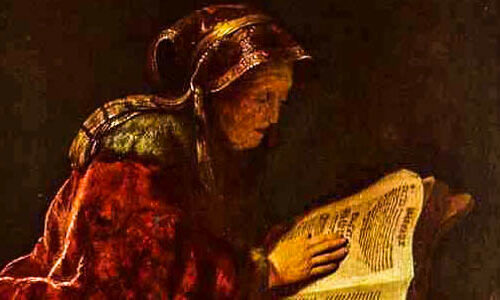Frail Woman, Fierce Faith
I remember sitting on her emerald and cream flowery sofa. She appeared frail with her coiffed white hair, arthritic hands, and five-foot frame. But as she spoke, I noticed something fierce gleaming from behind her gentle demeanor. This woman—widowed, aging, and often forgotten—possessed great faith.
Now as a married woman myself, I hold such women in high esteem. It’s difficult to be a widow. In Paul’s day, it was downright dangerous.
Consider the description he gave the Ephesians regarding the widows entrusted to the church’s care. “She who is truly a widow, left all alone, has set her hope on God and continues in supplications and prayers night and day” (1 Timothy 5:5).
In the Greek, widow is a play on words. It describes someone who has lost a spouse. But it also paints a picture of a city stripped of inhabitants and wealth. The woman described here is desolate and desperate, lonely and languishing. She has nothing—physically and emotionally. Like a broken city, she has no way to rebuild.
Paul knew the obstacle such aging ladies faced within Roman society. Women seldom owned property. They possessed no legal rights. Age and gender prevented them from pursuing an occupation. They were cast aside by their culture, left with little hope or help.
Yet amidst grief and poverty, the woman Paul portrays sets her hope on God. The gospel is real to her. Loss has loosened her affection for this world, and she looks to the One who stands beyond her situation and promises life both here and for eternity.
She prays. Literally, she pleads her case before the Almighty. This woman doesn’t give up on God when life gets hard. She gets down on her tender knees. She intercedes all day and into the wee hours of the night. She knows God is her ultimate portion. And she begs him to meet her every need.
Scripture tells the story of numerous women like the one Paul describes. Consider Anna, the prophetess who blessed baby Jesus and prophesied about him in the temple (Luke 2:36–38). She spent somewhere around sixty years in God’s service, fasting and praying, proclaiming and waiting.
Or ponder the nameless woman Jesus noticed at the temple as she dropped her feather-light offering into the receptacle (Luke 21:1–3). Her change barely made a clanking sound as it wisped its way to the bottom of the container. With two coins she gave God everything, and he took notice of her.
As I think about these women, I’m struck by their faith. Widowhood didn’t make them faithful—though it may have increased their spiritual progress—rather it revealed a faith already formed. Adversity showed what was planted deep within these women’s souls. They hoped in God.
Do I? Do we? Before these women were widowed, they gave. Before they faced loss, they prayed. Before they grieved, they believed. And as they confronted tragedy, they kept hoping in the One who’d been with them before.
Let’s learn from their example and the faith they displayed. Let’s be women who pray, fast, serve, and hope. So that when adversity arises—whatever form it may take—we stand on the God we’ve trusted all along.



One Comment
SonShine
Widowhood
Beautiful and poignant. We can learn much from these faithful servants. To consider them is a marvelous gift. Thank you for the reminder to "remember"